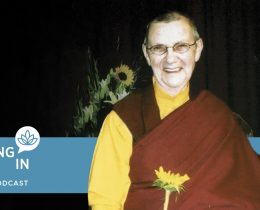Omega: You’ve said, “The heart that hurts is the very same heart that heals.” How do we build a bridge from personal to collective healing, and apply inner gentleness to systems and structures that urgently need to alter?
angel: I think it’s incumbent upon us waving our flags about inner work during such a pressing experience of social ills and destabilization to respond—at least as best we can.
One main challenge of approaching transformation in society through inner work is that people think it means focusing on others: “If I feel this way about that person....” Then we’re up against a struggle to navigate all the people not in our tribe or chosen collective. Our society is broken and we are challenged with a systematic structure that has kept us divided. We mistakenly think the way to get beyond it is to have compassion for other people in a sort of bland way and it’ll all get better, but that hasn’t been working.
My sense of the path from inner work to social change is for each of us to be much more intimate with our own self, and the brokenness and suffering that we ourselves experience.
That’s not to be mistaken with a fixation on me, me, me, but rather a true, intimate relationship (which is Buddhism’s stamp) with our own suffering. When we touch suffering deeply, it becomes very apparent that we would not want anyone to experience the suffering. So that we’re not saying, “I know the suffering of my broken heartedness. I know the suffering of being witness to prejudice and people being marginalized and mistreated and denied opportunity. But I can’t touch them because it’s too hard.” It takes courage and practice and a developed capacity to really touch the heart of our own suffering because it feels uncomfortable. We’re not taught to tolerate discomfort—but quite the opposite—to get away from discomfort as quickly as possible and paper it over with television and Facebook and all manner of things.
So touching inner work to social transformation is about willingness and touching the heart of our own suffering, out of which arises an organic understanding that we would not want anyone else to experience such suffering and, therefore, we wish for their well-being. The deeper we go into our suffering the more fervent the wish for the well-being of others. We act. We act because our inaction is felt as a participation in that suffering.
Omega: Communities around the country are struggling to respond to violence with grace. How do you reach for curiosity as a tool to access courage and vulnerability in difficult moments?
angel: I access curiosity by being curious about my own feelings. When I enter a situation and notice that I’m experiencing discomfort or I’m disassociated or cut off from my feelings, I become exquisitely curious about that. Where is that feeling of disconnect arising from? What could it be? I follow it with the curiosity of a child. They don’t just run in and throw the closet open but follow the breadcrumbs of this tiny piece of experience: this way that my stomach feels clenched; this way that I notice the room got darker and more narrow; this way that I notice that dark face in front of me brings a little bit of quickness to my breath. What is it about this dark face that should bring a quickness to my breath? What is actually there?
You’re following breadcrumbs, not saying, “Hey, you’re some person I’m feeling some anxiety and fear about. I don't know where it comes from, but let me come and hug you.” Rather, what is this experience of contraction or disconnect with the human being in front of me?
If I really feel out of sorts, I might get in touch with the grief that generally attends our loss of contact. If we’re feeling disconnected, right behind it—if we can stay planted right where we are instead of running away from the feeling and the space—we’ll notice that hidden behind that experience is a very subtle sense of grief. Because we’re fundamentally oriented to be connected to one another, so we can’t experience anything but grief when we are disconnected. Our anger and reactivity, our running away and taking flight—all of that is a result of being mortified that we’re having an inappropriate experience of our humanity. We are experiencing loss—a moment of disconnect from our own humanity.
If we are not trained, we may react by lashing out. Just like small children react to being frightened by screaming, crying, hiding in a corner, or running away. It is maturity that enables us to stay put and notice the sensations and be curious about where they’re coming from and follow the breadcrumbs back to the connection.
Omega: People often walk a self-conscious line between belonging in, or even “representing,” a larger community and expressing their individual uniqueness. Diversity is a strength, but many movements, and individuals, experience internal fracturing. How do we practice holism as individuals and collectively?
angel: Problems arise when someone gets the idea they have the right understanding or view on how the whole should express itself and doesn't allow for the unique permutations that are the gift of diversity. We become controlling about how people ought to show up or do things.
On the other hand we can become obsessed with expressing our uniqueness precisely because we don’t feel like we belong. We can get overly engaged with the need to express ourselves. That’s a direct response to not feeling seen.
These two things are connected. When the whole doesn’t try to make everyone conform but realizes a plethora of diverse expressions of the whole as valid, then individuals can soften because they truly belong and they don’t have to assert an obsession around identity.
All we’re grappling with fundamentally is our sense of overwhelming separation. We’re just kicking and screaming and thrashing because we want to belong. And we need that, as a socially organized primate, right? We need to belong.
This society was built on division right from the beginning—division was not only fostered, it was constructed, then fostered, then institutionalized, and then concretized in law, in all ways.
Imagine a family unit—what would it be like for children to feel so cut off from what is now their family? To be told in so many ways, you are not really a part of this family. You don’t really belong here. We didn’t really want you. And if you are going to be here, the only way you can be here is at a great disadvantage, so that your lack of belonging is assured.
At the heart of what ails so much of marginalized communities, is how much they want to belong, which we never really say, and we don’t say that what ails so many white, hetero, cis-gendered men is their wanting to belong, and not. What if we could say, “Oh, here’s what’s happening: We are brokenhearted because we feel forced in this society to cut ourselves off from our humanity in order to maintain this outdated, always demeaning, dehumanizing structure that was designed to afford privileges and economic advantage to a few on the backs of many”? We all are graded in that way, and in pain as a result.
If we can’t belong, then we want to be special. We want to be a celebrity. We all have our own personal media platforms. How crazy is this? I’ve got four of them myself. It’s like The angel Show and I'm always directing and producing and writing and projecting out this angel critter. We just really want to belong and be seen. The social media and technological moment that we find ourselves in is such a very strong expression of exactly what is going on with us. We want to be heard. We want to matter.




